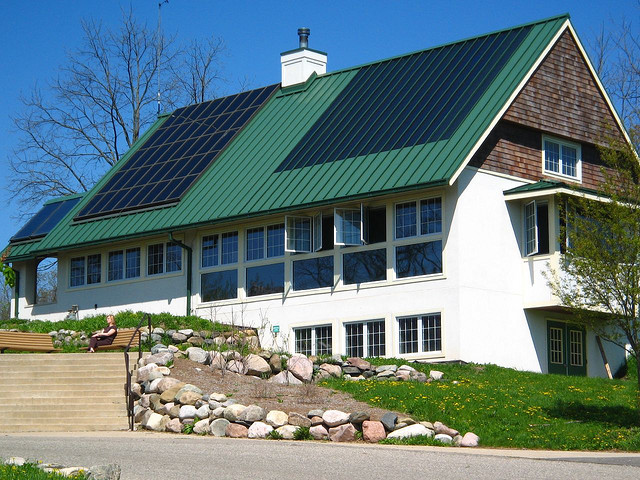Podcast: Play in new window | Download
Subscribe: RSS
Oklahoma’s legislature has now followed Arizona’s in authorizing a penalty to be charged people who install small solar arrays or wind turbines and connect them to the grid. This is happening as a result of a campaign by the American Legislative Exchange Council (ALEC), an industry-financed group (backed heavily by the Koch Brothers, among others) that writes and distributes “model” legislation for state governments. This is the equivalent of the crew of the Titanic systematically smashing holes in lifeboats to make sure everybody does their best to save the ship. It is utterly wrong-headed, but its unintended consequences could be quite good.
Industry has awakened to the marketing possibilities of renewable energy. Even WalMart has draped a few solar panels conspicuously on a handful of its stores. Large new industries have sprung to life manufacturing enormous wind turbines, giant solar “farms” along with the transmission lines needed to knit them into the grid. To this industry, a handful of solar panels here and there, or a window-fan-sized turbine now and again, represent chump change. Yet small scale renewables are becoming relentlessly more popular, so they must be stopped.
It’s hard to get into the mind set that comes to this conclusion. ALEC says that people who go to the trouble and expense of generating their own power are “free riders on the system.” Yet the greatest expense incurred by the power industry is building capacity that is needed to meet peak demand, but seldom used otherwise. Solar and wind power reduce peak demand. Especially solar, which is at its greatest when the sun is shining hottest, requiring the most air conditioning.
But the industry says that renewables must be punished. (In Arizona, the utilities asked for a fee of $100 a month; they got about $5.) Imposing a financial penalty will work, at first, because most people are installing solar and wind energy with the wrong priorities in mind. The top questions asked by people considering renewable energy are: how much will it reduce my electric bill? and how quickly will I get my investment back? Nobody asks questions like these when they buy a Hummer or a house, but renewable energy must show great financials in order to be considered.
This is like inquiring, before you board the lifeboat from the Titanic, whether it has leather seats, and what is the dinner menu. It’s not there to make you comfortable, it’s there to save your life.
Distributed energy — that is, making your energy where you use it — is the only hope for our energy future. The massive, creaky old grid is going to fail. Ever since regulated energy utilities were transformed 30 years ago into lean, mean profit machines accountable to nobody but hedge funds, nobody has been spending the money required for maintaining, repairing and replacing the elderly elements of the grid. It follows, as the flies the garbage, that the grid will fail. Examples and precursors abound.
There is great irony in the fact that most of the people who are these days going to great expense to install solar systems are choosing not to store their electricity (that is, no batteries) but simply to tie to the grid, so they reduce or eliminate their electric bill. As a result, when the grid goes down, they have no electricity. They will have thousands of dollars worth of panels on their roof generating electricity that they will have no way to use.
They can’t even install a switch so they can use their electricity during the day, because most panels installed today have mini-inverters on each panel that invert the voltage from 12 volt direct current coming off the panel to 110-volt alternating current. These mini-inverters require 110-volt AC and do not work unless connected to the grid!
And now, if ALEC has its way with the rest of the states, people considering this clunky arrangement will have the added disincentive of a financial penalty, which the utilities claim they need to offset the costs of the infrastructure needed to accommodate the home generators. You’d think they needed a second line to carry the outgoing power. They don’t.
The intent of this legislation obviously is to discourage home renewable-energy installations. But wait. There’s more. If the legislation reads as it is being reported, the fee applies to systems connected to the grid. Fine. Don’t connect. Better yet, disconnect. Avoid those panels with the mini-inverters (although workarounds are being experimented with, so watch that space), buy batteries, and use the grid not at all, or as a backup.
Bingo. Your lifeboat does have leather upholstery. And catered lunches.

Tom, At present utilities are bi polar. Some strongly support distributed production. Some are strongly opposed. Good federal policy here could sort out state mandates. There a lot of smart grid and micro grid investments just now gearing up. And things like thermal storage. Some utilities are in the solar install business themselves, ex NRG Energy. Indeed, a hybrid solution may be possible where we can switch our systems to on or off grid as desired which would be a good start. More likely we’ll need a home storage solution better than batteries. Electricity is an industry that’s being reinvented. They’ll be some false starts along the way.
Bipolar indeed. What they say with their PR, and what they say with their money, are often polar opposites. In addition to the campaign to penalize small wind and solar producers, they are campaigning through ALEC in all of the 43 states (plus DC) that have net metering laws (requiring that the utilities pay for electricity coming into their system from small renewable-energy installations) to repeal them. They may say they support distributed production, but their money talks differently.